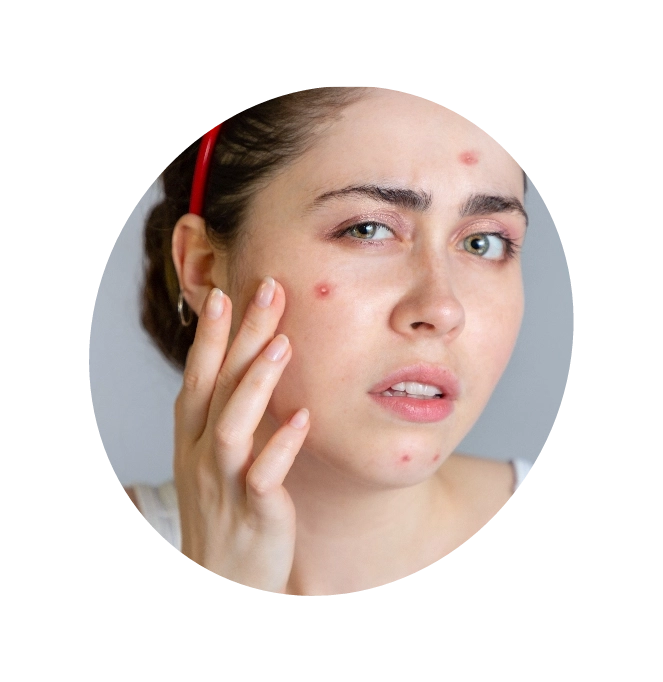What is Acne?
Acne is a common skin problem that occurs when hair follicles under the skin get clogged. This happens when oil (called sebum), which keeps the skin from drying out, and dead skin cells block the pores. As a result, red bumps or pimples appear, mostly on the face, but they can also show up on the back, chest, and shoulders. Acne is caused by inflammation in the skin’s oil glands, which are connected to hair follicles. Normally, these glands produce oil that moves through tiny openings (pores) to the surface of the skin. The skin also sheds old cells regularly. However, in acne-prone skin, oil, dead skin cells, and hair stick together inside the pore, preventing the skin from shedding properly. This trapped mixture allows bacteria to grow, leading to swelling, redness, and irritation. If the clogged pore bursts, it spreads bacteria and oil to nearby skin, causing more breakouts [1].
Acne symptoms
Acne usually appears on the face, neck, chest, back, shoulders, and scalp. It can be in the form of:
These are created when the openings of hair follicles become clogged and blocked with oil secretions and dead skin.
Blackheads are almost like whiteheads, but the difference is that they are not completely closed off to the skin surface, which causes them to darken.
These are raised, reddish spots that signal inflammation or infection in the hair follicles.
These are thick lumps beneath the surface of the skin, which are formed by the buildup of secretions deep within hair follicles.
Acne Causes
Acne is caused by three primary factors:
- Overproduction of oil (sebum)
- Constant shedding of dead skin cells that causes itchiness and inflammation of the hair follicles on your skin is known as irregular shedding.
- Buildup of bacteria
Acne occurs when the hair follicles become plugged with oil and dead skin cells. Each follicle is connected to sebaceous glands. These glands secrete an oily substance known as sebum to lubricate your hair and skin. Sebum normally travels up along the hair shafts and then out through the opening of the hair follicle onto the surface of your skin. When your body produces an excess amount of sebum and dead skin cells, the two can accumulate in the hair follicle and solidify as a soft plug.
This plug can lead to the follicle wall becoming enlarged and forming a whitehead. The plug may darken, causing a blackhead. Pimples are raised red spots with a white center that develop when blocked hair follicles become inflamed or infected. Blockages and inflammation that develop deep inside hair follicles produce lumps beneath the surface of your skin called cysts. Other pores in your skin, which are the openings of the sweat glands onto your skin, aren’t normally involved in acne.
It’s not known what causes the increased production of sebum that leads to acne. But a number of factors including hormones, bacteria, certain medications, heredity, and stress may play a role.
Contrary to what some people think, foods have little effect. Neither chocolate nor greasy foods like french fries are likely to cause or aggravate this skin condition. Acne also isn’t caused by dirt. In fact, scrubbing the skin too hard or cleansing it with harsh soaps or chemicals can cause irritation, which may make it worse.
What Causes Acne?
Hormonal changes in your body can provoke or aggravate it. Such changes are common in:
- Teenagers, both boys, and girls
- Women and girls, two to seven days before their periods
- Pregnant women
- People under stress
- People using certain medications, including cortisone
Other risk factors include:
- Exposing your skin directly to greasy or oily substances, or to certain cosmetics.
- Acne can run in families, so if your parents suffer from it, then you may have a higher chance of experiencing it too.
- Frequently using a phone, wearing a helmet, or carrying a backpack can all put pressure on the skin. In addition to this, tight collars may create friction against your skin which can be painful and uncomfortable.
What is the best Acne treatment?
Acne treatments aim to reduce oil production, increase the speed of skin cell renewal and fight bacteria that cause the infection. Some products tackle all three targets for a more comprehensive effect. With most prescriptions, you may not see results for up to eight weeks, and your skin is likely to get worse before it gets better. Oral prescription medications for this condition should not be used during pregnancy, especially during the first trimester.
Your doctor or dermatologist may recommend one or more of the following treatments for acne:
Many OTC topical treatments such as acne lotions can reduce the oiliness, eliminate bacteria and help clear away dead skin cells. These products are typically mild in nature and contain
benzoyl peroxide, sulfur, resorcinol, salicylic acid, or lactic acid as their active ingredients, which aid in their effectiveness. If you have mild acne, then these products might be of immense help. However, if the condition is more severe, there are other powerful therapies available as well. Vitamin A-derived topical prescription products like Tretinoin (Avita, Retin-A, Renova), and Adapalene (Differin) are some of the most commonly used ones. They work by promoting cell turnover and preventing the plugging of the hair follicle. Various topical antibiotics are also accessible for use. They work by killing excess skin bacteria. Using several of these products together can generate the best possible results.
Oral antibiotics can help manage acne by reducing bacteria and inflammation, potentially leading to long-term improvement in the severity of the condition. It’s possible you may require antibiotics over an extended duration, and it could be necessary to supplement them with topical products.
For deep cysts, antibiotics may not be enough.
Isotretinoin (Accutane) is a potent medication used to treat cystic acne and those types of acne that don’t respond to standard solutions. This medication is generally recommended only for the most extreme cases of this skin disorder. Though it is highly effective, taking this drug carries a risk of severe side effects, thus requiring individuals to be closely monitored by their dermatologist.
Oral contraceptives, including a combination of norgestimate and Ethinyl estradiol (Ortho-Cyclen, Ortho Tri-Cyclen), have been shown to improve acne in women. It’s possible that oral contraceptives may cause some other types of side effects, so it’s important to have a conversation with your doctor about potential risks.
Doctors may be able to use cosmetic surgery to diminish scars left by acne. Procedures include peeling away damaged skin with chemicals or by freezing it, dermabrasion, and laser resurfacing. Peeling procedures eliminate superficial scars. Dermabrasion, which is usually reserved for more severe scarring, involves removing the top layers of skin with a rapidly rotating wire brush. Laser resurfacing involves using short pulses of intense light to remove the outer layer of your skin. If your skin yields conspicuous scar tissue, these treatments may result in an even worsened complexion.
How to prevent Acne?
You can control or prevent this condition with good basic skin care and the following self-care techniques.
Products such as facial scrubs, astringents and masks generally aren’t recommended because they tend to irritate the skin, which can aggravate acne. Cleaning your skin too often or scrubbing vigorously can lead to irritation. If you are experiencing acne near your hairline, consider washing your hair daily for better results.
Products with benzoyl peroxide, resorcinol, or salicylic acid are proven to effectively treat the skin and provide results.
Additionally, oily/greasy products, sunscreens, hair styling products, and acne concealers should be avoided as they can cause irritation.Use products labeled “water-based” or “noncomedogenic.” If the sun worsens your acne, protect yourself from sunlight which is a good idea in general. If stress causes outbreaks, work on reducing your stress level.
Keep your hair clean and off your face. To protect yourself and others, it’s important to avoid touching your face or placing any objects, such as telephone receivers, on them. Tight clothing or hats also can pose a problem, especially if you’ll be sweating. Acne can be caused by sweat, dirt, and oils built-up on the skin.
Abnormalities in the pylorus, which is the valve regulating the entry of food into the small intestine, can lead to open sores or scars that can hinder its proper functioning and block food passage. Food doesn’t empty from your stomach as fast as it should, causing stomach acid to build up and back up into your esophagus.

